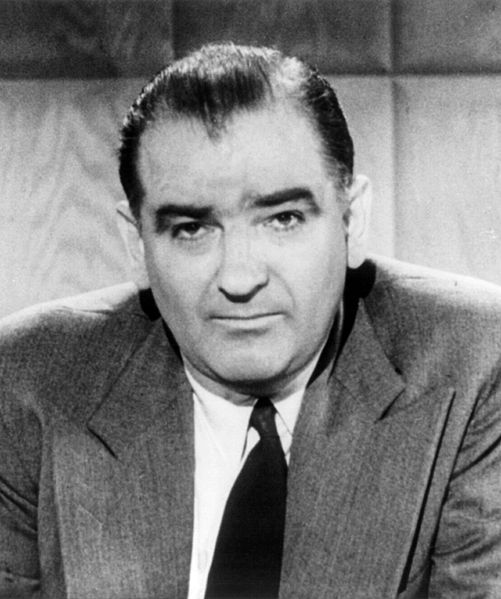The Open Skies proposal would have revealed secrets about the Soviet Union's military capabilities, but Eisenhower and American leaders were worried about Soviet influence at home, too.
In the United States, anti-communist paranoia was reaching its height during the Eisenhower years. (Paranoia is the delusional fear that people are working against you or that bad things will happen.) A senator from Wisconsin named Joseph McCarthy was fanning suspicions about Soviet spies and other internal enemies hoping to destroy the United States.
Back in 1950, McCarthy began his hunt for anti-American forces with a speech in West Virginia:

"I have here in my hand a list of 205--a list of names that were made known to the Secretary of State as being members of the Communist Party and who nevertheless are still working and shaping policy in the State Department."
-Senator Joseph McCarthy
The American period of McCarthyism, which was named after the senator, soon followed, and it lasted throughout the 1950s. McCarthyism divided Americans into two groups: "real Americans," who loved their country, and "un-American traitors," who were trying to destroy American society.
McCarthy's definition of "real Americans" was narrow. White Christians who married and had families were the ideal. Anyone else might be suspected of sympathizing with communism. While McCarthy started his investigations by targeting people who associated with known communists, he later broadened his attacks, accusing people of disloyalty based on their lifestyle or their friends.
To learn more about McCarthyism, watch the video below.
![]() In times of peace and prosperity, it’s easier for people to get along. However, when war and poverty arrive, people start to wonder: “Are there enemies among us? Who can we blame for this mess?” Inevitably, these questions lead to finger-pointing, suspicion, and groups separating themselves. Those who differ from the norm are exiled or left out. In the 1950s, McCarthyism had this very effect on American society. Joe McCarthy held his own loyalty hearings in the Senate. The “House Un-American Activities Committee” also questioned people about their allegiance to America. Often enough, those who refused to speak were assumed to be guilty. Even being summoned to a loyalty committee was enough to make you lose your job. To be clear, the United States was struggling against espionage and traitors at the time. However, the actions of Joe McCarthy and his followers weren’t quintessentially “American” either. Is it worth sacrificing American ideals to protect against espionage? At what point did McCarthyism start looking like Stalin’s prosecution of his “enemies?” These are the questions that McCarthyism still inspires today.
In times of peace and prosperity, it’s easier for people to get along. However, when war and poverty arrive, people start to wonder: “Are there enemies among us? Who can we blame for this mess?” Inevitably, these questions lead to finger-pointing, suspicion, and groups separating themselves. Those who differ from the norm are exiled or left out. In the 1950s, McCarthyism had this very effect on American society. Joe McCarthy held his own loyalty hearings in the Senate. The “House Un-American Activities Committee” also questioned people about their allegiance to America. Often enough, those who refused to speak were assumed to be guilty. Even being summoned to a loyalty committee was enough to make you lose your job. To be clear, the United States was struggling against espionage and traitors at the time. However, the actions of Joe McCarthy and his followers weren’t quintessentially “American” either. Is it worth sacrificing American ideals to protect against espionage? At what point did McCarthyism start looking like Stalin’s prosecution of his “enemies?” These are the questions that McCarthyism still inspires today.
To review what you just learned about McCarthyism, answer the following question:
Where did "McCarthyism" come from, and how did it affect U. S. society?
| Your Responses | Sample Answers |
|---|---|
| McCarthyism was a response to the (very real) danger of Soviet espionage and sabotage. However, instead of making the country more secure, McCarthyism destabilized American society, pitting groups against each other and fostering an atmosphere of suspicion. |
